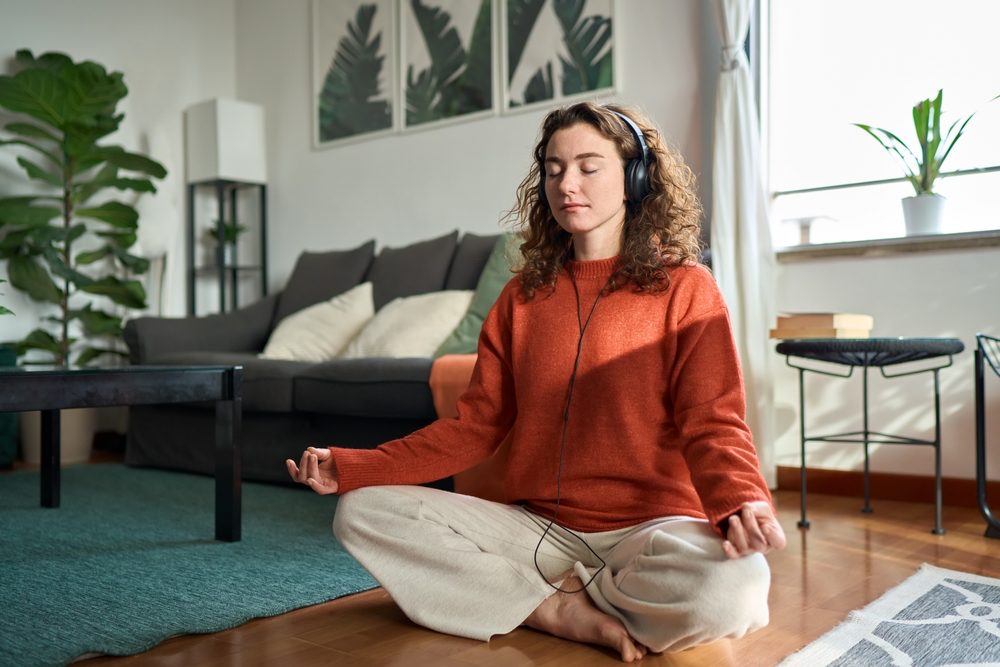People are having a lot of stressors in their lives, which makes it essential to seek mental health professionals through apps. These applications are the finest source for managing stress, anxiety, and overall psychological health since they offer a wide range of features. From getting guided meditation and mood tracking to therapy sessions, this article covers the 10 best mental health apps alongside the way to create one.
Top 10 Mental Health Apps of 2025
You can use mental health mobile apps if you ever feel disturbed and do not have anyone to talk with. Thus, the following are the top 10 options you can consider while getting a consultation online.
1. Headspace (Android | iOS)
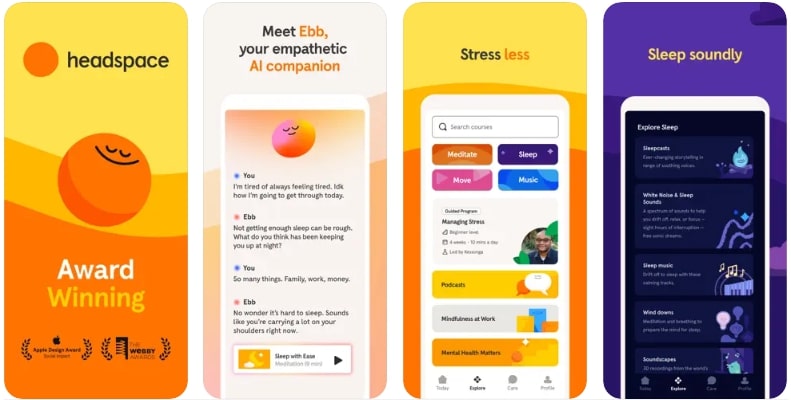
It’s a comprehensive app designed to enhance mental health through guided meditation for sleep and stress relief techniques. Over 500 guided meditations, ranging from quick 3-minute rest to in-depth sessions, are available on this app. Moreover, it provides specialized resources for better sleep through relaxing sounds and guided sleep meditation. Plus, users can explore app tracking features to monitor progress and set goals.
Pros
- With the help of this app, you can talk to your personalized coach to get guidance and share your progress.
- In addition, this platform allows users a flexible subscription option that includes monthly and annual plans.
Con
- You might need to share personal information, such as phone numbers and media files, and allow access to the microphone and camera.
Pricing Plans
- In-App Purchases: From $12.99 to $94.99
2. BetterHelp (Android | iOS)
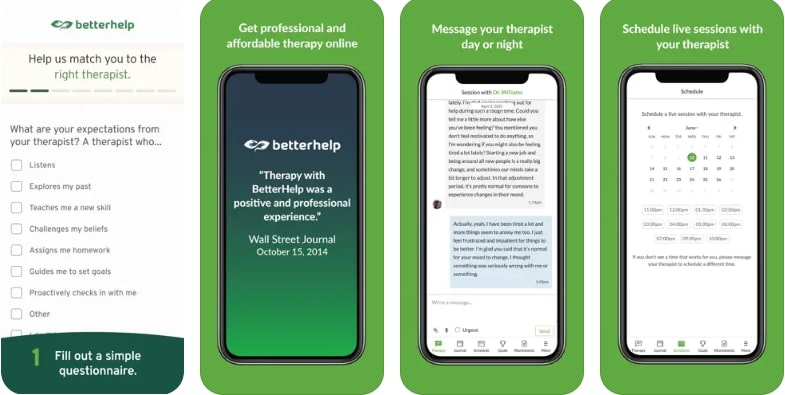
BetterHelp is a mental health phone app where you can schedule live sessions with your therapists. It provides you with over 20,000 trained therapists who are experts in different domains. Besides, users can message and consult with their therapist any time of the day. They can also access group sessions and talk to other people who are facing the same issues.
Pros
- Other than messaging your therapist, users can have a face-to-face video call for a better experience.
- You can choose your own therapist whose expertise resonates with your issues.
Con
- It can be a little expensive for low-income people as it has a slightly higher rate.
Pricing Plans
- In-App Purchases: From $70 to $100 per week
3. Talkspace (Android | iOS)
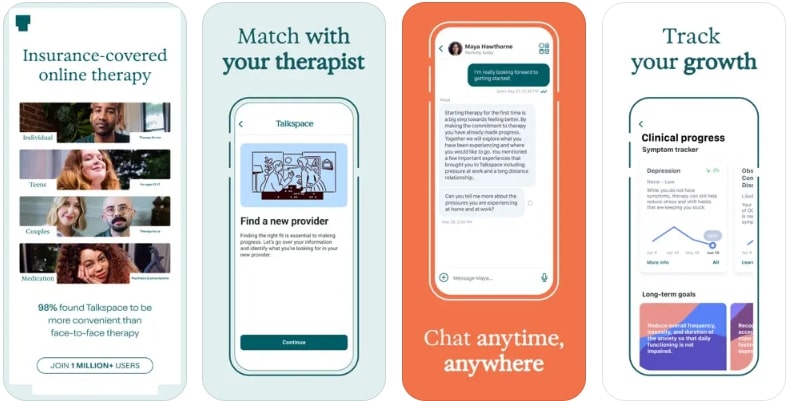
When it comes to the most convenient and affordable way to improve mental health and promote well-being, you can consider Talkspace. The best part is it provides therapy sessions via text, audio, and video calls. When you share your problem, this app will assign a suitable therapist according to your needs. You can also share your insurance info; it’ll let you make it available if you are eligible.
Pros
- Users can track the growth and progress of their mental health by checking the insights of this mental wellness app.
- It also offers different types of therapies for couples, individuals, and LGBTQIA+.
Con
- The app response is limited to once a day and five times a week, which makes it useless for emergency situations.
Pricing Plans
- In-App Purchases: Free of cost
4. Breathe, Think, Do With Sesame (Android | iOS)

It’s a free mental health app for kids with Sesame, a Street monster friend, that helps calm kids and solve problems. Not just that, it’s a bilingual app that teaches your kids how to solve problems in English and Spanish. Furthermore, you can touch the monster that takes deep breaths and thinks of plans to quickly address problems. Plus, it has a robust section for parents to navigate their kids’ challenges.
Pros
- You can explore 5 interactive activities with their unique everyday challenges.
- This app also offers personalized encouraging sentences to help children practice while taking deep breaths.
Con
- Its features require a built-in microphone, so if your device does not support a microphone, it’ll not work on it.
Pricing Plans
- In-App Purchases: Free of cost
5. Worry Tree (Android | iOS)
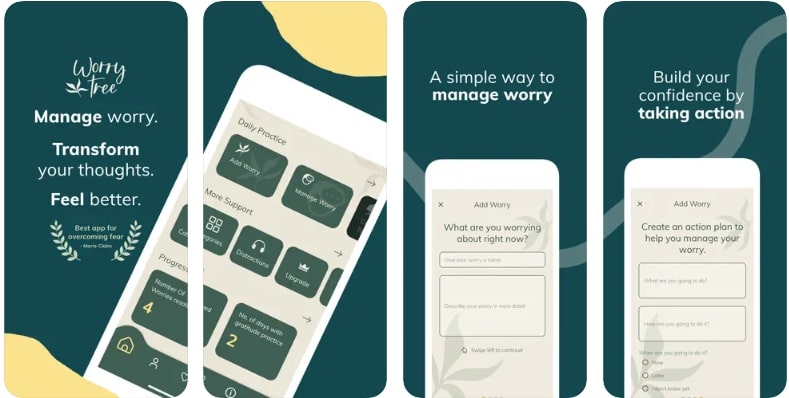
Worry Tree stands out among other mental health apps because it’s designed to help users manage stress and anxiety through CBT strategies. This app enables users to identify and challenge negative thoughts they face. Besides, it lets users record and download their worries and show them to a therapist for customized management plans. It provides practical mental health management tools for those struggling with anxiety and stress.
Pros
- It also offers a 30-day journey to stop worrying by offering different tools and techniques.
- In addition, it offers accessible options like language, support, and a customizable theme for an inclusive experience.
Con
- This app is not suitable for professional therapy, limiting its use for severe mental health concerns.
Pricing Plans
- In-App Purchases: From $1.99 to $49.99
6. Moodfit (Android | iOS)
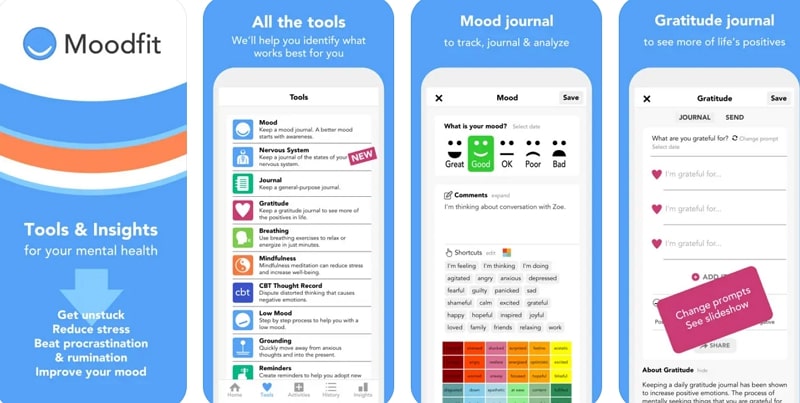
Moodfit is an innovative mental wellness app designed to help users track and manage their overall well-being. It facilitates users with many tools, including mood tracking, gratitude journal, and cognitive behavioral therapies inspired exercises. Moreover, users can set their personalized daily goals, including mental health workouts, breathwork, and mindfulness. This app uses CBT techniques to overcome distorted thinking that causes emotional discomfort.
Pros
- It also allows users to take mental health assessments like PHQ-9 (depression) and GAD-7 (anxiety).
- Besides, this app provides educational and inspirational content about topics like rumination and motivation.
Con
- Users might need a premium subscription to avail themselves of some of its advanced features.
Pricing Plans
- In-App Purchases: From $9.99 to $39.99
7. Happify (Android | iOS)
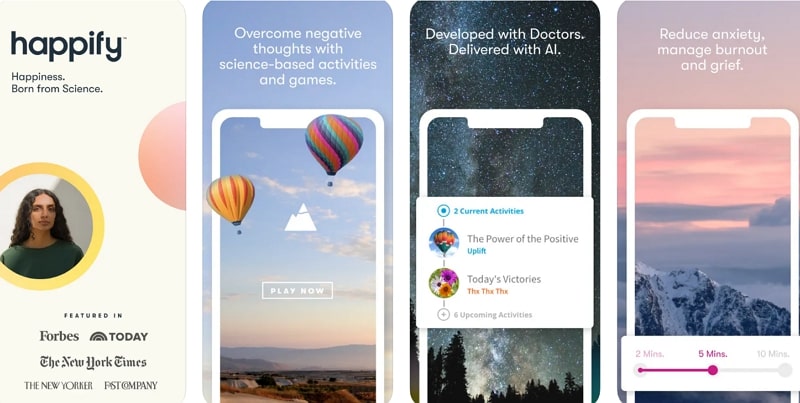
It’s considered a leading phone app for mental health, focusing on activities and games to reduce stress. The techniques to overcome negative thoughts are developed by leading scientists and experts who have evidence-based interventions in positive psychology. Furthermore, it facilitates users with mindful tasks and shows which motivate them to live a better life. This app even benefits depressed individuals by achieving mindfulness through meditation.
Pros
- With the help of this mental health app, users can track and compare their everyday progress.
- It also provides a 20-page character strength report for patients in partnership with a renowned institute.
Con
- Using this app for mindful therapies requires ongoing engagement to benefit from long-term benefits.
Pricing Plans
- In-App Purchases: From $9.99 to $449.99
8. Finch (Android | iOS)
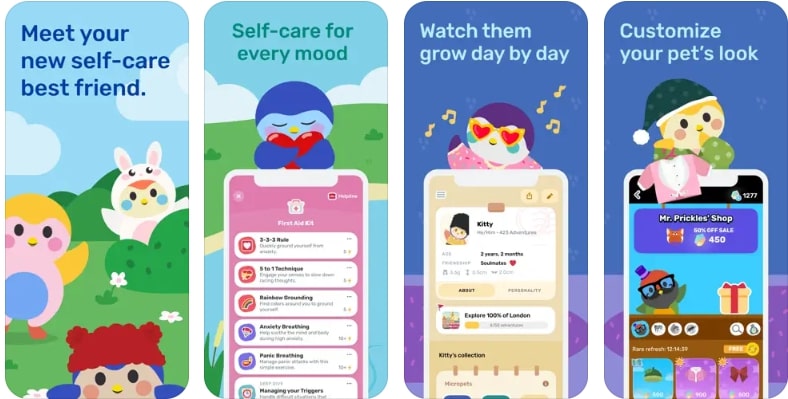
Among mental health apps, Finch offers an approach of using a virtual pet that grows as users engage in self-care activities. Users can use its mood journals to clear their minds, track important moments, and practice self-love. It also assists depressed patients by giving insights into their mental health from combined analytics on their mood journaling. Moreover, this app provides users with motivational quotes to help them gain new perspectives.
Pros
- Using its habit tracker tool, one can set goals and celebrate their wins for healthy habits.
- Additionally, guided breathing techniques assist users in calming their nerves and energizing their minds.
Con
- Gamification’s way of self-care might not appeal to many senior users who only want to focus on well-being.
Pricing Plans
- In-App Purchases: From $5.99 to $69.99
9. Worry Watch: Anxiety & Mood (iOS)
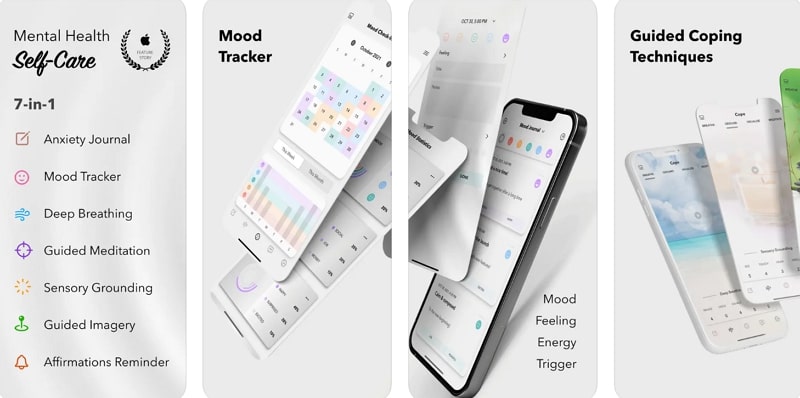
This app stands out among apps for mental health because it’s built on the foundation of cognitive science. Moreover, this app provides clear voice and visual instructions with a timer to provide a soothing ambiance. It also enables users with guided coping techniques that help tap the body’s natural relaxation response to deal with stressful situations. With its mood journal, individuals can check their moods, feelings, and everyday energy status.
Pros
- This app facilitates practices by focusing on users’ senses and using the 5-4-3-2-1 technique.
- After every session, individuals can record and write what’s on their minds.
Con
- Android users can not benefit from this app because it is available only on iOS.
Pricing Plans
- In-App Purchases: From $2.99 to $11.99
10. Insight Timer (Android | iOS)
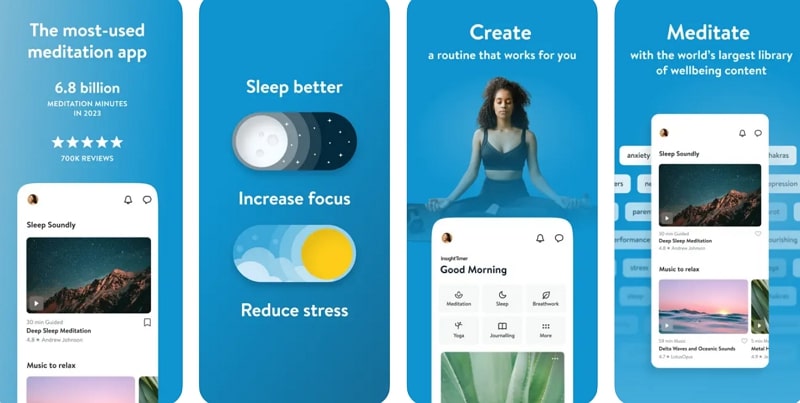
A notable mental health phone app that provides users with short meditations while helping them to build a simple daily habit. With numerous music tracks and ambient sounds, it helps users calm their minds in stressful conditions. Using this app, individuals can join thousands of discussion groups for beginner and sleep meditation. Furthermore, depressed individuals can browse multiple popular topics, including effective sleep schedules and relationship management.
Pros
- Users can join 17,000+ leading meditation teachers, musicians, and sleep experts to work on themselves.
- With the help of this app, one can also customize their mediation timing to start the process upon availability.
Con
- Individuals might require a premium subscription for certain features like premium meditation.
Pricing Plans
- In-App Purchases: From $1.99 to $99.99
How to Choose the Best Mental Health Apps?
When it comes to choosing the best mental health apps, there are a lot of factors that you need to look for. Therefore, this section covers 7 considerations you need to know before choosing any mental health app.
1. Purpose and Features
First of all, choose an app that meets your certain mental health needs, whether it’s stress, anxiety, or depression. This will then allow you to look for features that might include medications or CBT, according to your issues. Hence, no matter the application you go for, verify that it offers you all the essential tools that suit your well-being.
2. Ease of Use
If you are new to mental health applications, ensure that they support a simple and user-oriented interface. With this facility, you can easily locate certain tools and use them without any learning curve. Besides the interface, look for an app with clear built-in instructions regarding usage for a better user experience.
3. Credibility and Professional Support
Many top mental wellness apps in 2024/2025 will be designed and developed by those who have expertise and know-how about mental health. Hence, if you are choosing any, make sure that mental health professionals design them. Once you adhere to this consideration, you can easily find scientifically backed methods, including CBT or mindfulness practices.
4. Privacy and Security
Moving on, ensure the app protects your personal data with advanced encryption technology and strong privacy policies. Moreover, you are advised to read the terms and conditions to learn how your information is used. While doing so, users must ensure that their data remains confidential and used solely to improve the overall experience.
5. User Reviews and Ratings
In addition to security, review the application feedback of other users to know what kind of experience they had. While reading the reviews, go through both positive and negative aspects to determine its ease of use and overall functionality. If you find any negative reviews, seeking another option is better than wasting money.
6. Customization and Flexibility
As you review the reviews and choose an app, ensure that the application allows you to personalize your experience. This usually includes having features like setting reminders or choosing the desired layout of the interface. Once you have this facility, you can easily choose an app that better fits your needs and lifestyle.
7. Cost and Value
Cost is the main factor since it determines whether the application justifies its benefits and features. There are many apps that offer your trial version, so you can choose it before committing. Additionally, ensure that any paid features enhance your experience and provide real value.
How ZEGOCLOUD Can Assist in Developing Mental Health Apps
Developing mental health apps requires a combination of real-time communication features, security, user engagement tools, and scalability. ZEGOCLOUD offers a range of solutions that can help developers build robust, user-friendly, and secure mental health applications, similar to Teladoc.
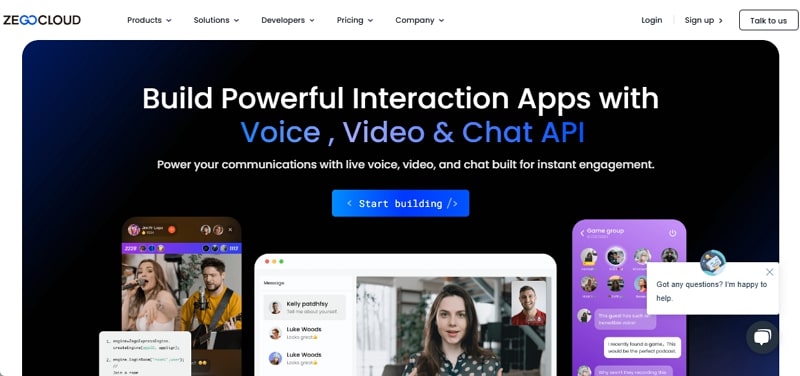
Here’s how ZEGOCLOUD can support the development of mental health apps:
- High-Quality Audio & Video Calls: ZEGOCLOUD enables seamless virtual therapy with high-quality audio and video calls, ensuring smooth communication between patients and mental health professionals.
- Real-Time Messaging: With instant messaging, ZEGOCLOUD allows ongoing support between sessions, enabling patients to communicate with therapists or support groups securely and instantly.
- Screen Sharing & Interactive Tools: Screen sharing allows therapists to share resources and activities with patients in real time, enhancing the therapeutic experience.
- Cross-Platform Compatibility: ZEGOCLOUD supports iOS, Android, and web platforms, ensuring users can access the app from any device, making it more convenient and accessible.
- Security & Compliance: ZEGOCLOUD provides end-to-end encryption and complies with data protection regulations (like HIPAA and GDPR), ensuring the privacy and security of sensitive patient data.
- Scalability & Performance: ZEGOCLOUD’s infrastructure handles growing user bases without compromising performance, ensuring smooth operations as the app scales.
- Integration with Healthcare Tools: ZEGOCLOUD can integrate with other healthcare tools like mood trackers and EHR systems, allowing for a more comprehensive mental health app.
ZEGOCLOUD provides the essential tools for developing secure, reliable, and engaging mental health apps. Its features help enhance user experience, improve accessibility, and ensure privacy, making it an ideal platform for mental health app development.
Conclusion
In essence, having the finest mental health apps is necessary to get support for managing stress, anxiety, and other psychological conflicts. Therefore, this article has gathered 10 foremost applications that you can easily choose as per your preferences.
However, as a developer, if you desire to create one yourself, we recommend using ZEGOCLOUD. Using this platform, you can easily insert APIs and SDKs with innovative features to make your mental health app stand out.
Read more:
FAQ
Q1. What is the most used mental health app?
Popular apps include Headspace and Calm for relaxation and meditation, as well as BetterHelp and Talkspace for online therapy.
Q2. Is there a mental health app that is free?
Yes, apps like MindShift CBT and Moodfit offer free tools for anxiety relief and mood tracking, with optional premium features.
Q3. What are the 20 types of mental disorders?
Examples include Anxiety Disorders, Mood Disorders, Eating Disorders, Personality Disorders, PTSD, OCD, ADHD, Schizophrenia, Sleep Disorders, Substance Abuse, and Neurocognitive Disorders. Each category may have specific subtypes.
Q4. What is the best management tool for mental health?
Apps like Headspace, BetterHelp, and Moodfit are great options. Traditional therapy, support groups, exercise, and good sleep are also effective. Choose what suits your needs best.
Let’s Build APP Together
Start building with real-time video, voice & chat SDK for apps today!









